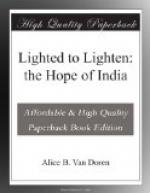What of the result? It is an atmosphere where East and West meet, not in conflict, but in a spirit of give and take, where each re-inforces the other. It is probably due to this friendly clash of ideas that the “typical” student at Isabella Thoburn strikes the observer as of no “type” at all, but a person whose ideas are her own and who has a gift for original thinking rare in one’s experience of Indian girls. In the class forums that were held during my visit the most striking element was the difference of opinion, and its free expression.
Scholarship. Lal Bagh is no longer satisfied with the production of mere graduates. Her ambition is now reaching out to post-graduate study, made possible by the gift of an American fellowship. The first to receive this honor are two Indian members of the faculty, one of them Miss Thillayampalam, Professor of Biology, whose home is in far-off Ceylon at the other end of India’s world. Henceforth, America may expect to find each year one member of the Lal Bagh family enrolled in some school of graduate work. Such work, however, is not to be confined to a scholarship in a foreign land, for this year the college enrolls Regina Thumboo, its first candidate for the degree of M.A. Her parents, originally from the South, emigrated from Madras to Singapore. There Regina was born, the youngest of five children. The father, a civil engineer in the employ of a local rajah was ambitious for his children, and, seeing in Regina a child of unusual promise, sent her first to a Singapore school, then on the long journey across to Calcutta and inland to Lucknow. At Lal Bagh she stands foremost in scholarship. When she has completed her M.A. in history and had her year of advanced work in some American university, she plans to return to the faculty of her Alma Mater.
Social Questions.
Scholarship at Isabella Thoburn College does not deal exclusively with the dusty records of dead languages and bygone civilizations. It is linked up with present questions, and is alive to the changing India of to-day. Among the matters discussed during my visit were such as: the substitution of a vernacular for English in the university course; the possibility of a national language for all India; the advisability of co-education; and the place of the unmarried woman in New India. To report all that the girls said and wrote would require a book for itself, but so far as space allows we will let the girls speak for themselves.
Co-education.
The Senior Class of eight discussed co-education with great interest, and when the vote was taken five were in the affirmative and only three in the negative.
[Illustration]
The following paper voices the objections to co-education as expressed by one especially thoughtful student:
“Co-education is an excellent thing, but it can only work successfully in those highly civilized countries where intellectual and moral strength and freedom of intercourse control the lives and thoughts of the student bodies. Unfortunately these fundamental principles of co-education are sadly lacking in India.




